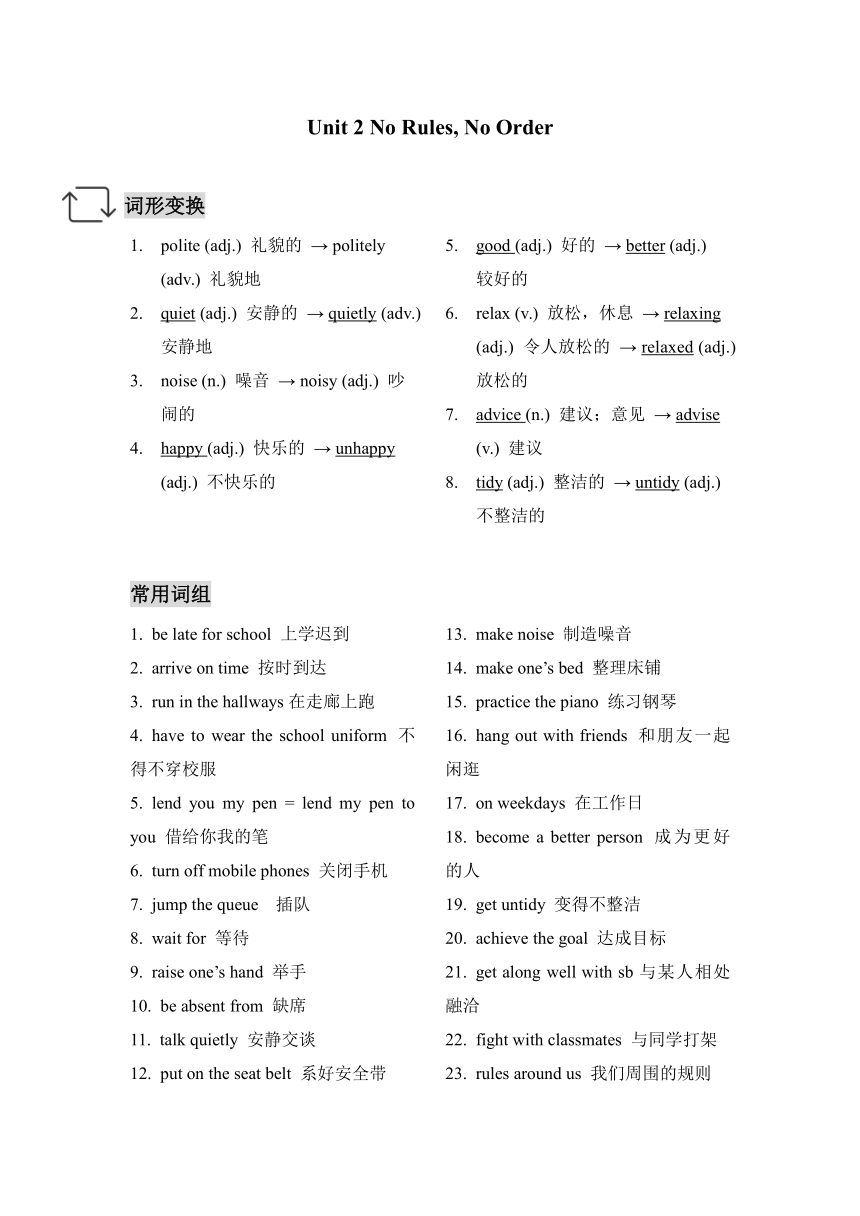
Unit 2 No Rules, No Order 词形变换 polite (adj.) 礼貌的 → politely (adv.) 礼貌地 quiet (adj.) 安静的 → quietly (adv.) 安静地 noise (n.) 噪音 → noisy (adj.) 吵闹的 happy (adj.) 快乐的 → unhappy (adj.) 不快乐的 good (adj.) 好的 → better (adj.) 较好的 relax (v.) 放松,休息 → relaxing (adj.) 令人放松的 → relaxed (adj.) 放松的 advice (n.) 建议;意见 → advise (v.) 建议 tidy (adj.) 整洁的 → untidy (adj.) 不整洁的 常用词组 be late for school 上学迟到 arrive on time 按时到达 run in the hallways在走廊上跑 have to wear the school uniform 不得不穿校服 lend you my pen = lend my pen to you 借给你我的笔 turn off mobile phones 关闭手机 jump the queue 插队 wait for 等待 raise one’s hand 举手 be absent from 缺席 talk quietly 安静交谈 put on the seat belt 系好安全带 make noise 制造噪音 make one’s bed 整理床铺 practice the piano 练习钢琴 hang out with friends 和朋友一起闲逛 on weekdays 在工作日 become a better person 成为更好的人 get untidy 变得不整洁 achieve the goal 达成目标 get along well with sb与某人相处融洽 fight with classmates 与同学打架 rules around us 我们周围的规则 touch exhibits 触摸展品 watch one’s step 注意脚下 follow instructions 遵循说明 wear formal clothes 穿正式服装 swimming suits 游泳衣 concert hall 音乐厅 常用词组 1. Walk in the hallway. 在走廊里走路。 2. Don’t run! 不要跑! 3. Be polite and treat one another with respect. 要有礼貌,彼此尊重。 4. Don’t litter. / You mustn’t litter. / You can’t litter. 不要乱丢垃圾。 5. - Can we bring our phones to class 我们可以把手机带到课堂吗? - No, we can’t. We must keep them in our lockers. 不可以,我们必须把它们放在储物柜里。 6. - Can we eat snacks in class 我们可以在课堂吃零食吗? - No, we can’t eat in class. We have to eat in the dining hall. 不可以,在食堂里吃。 7. Keeping the rules is good for us! 遵守规则对我们有好处! 8. Put up your hand if you want to ask your teacher a question. 请举手如果你想问老师问题。 9. There are too many rules in my life! 我的生活中有太多规定! 10. I mustn’t use my phone in class either. 我也不能在课堂上用手机。 11. I know some rules are important, but this is awful. 我知道一些规则很重要,但这太糟糕了。 12. You can’t use your phone because you need to focus on learning. 你不能使用手机,因为你需要专注学习。 You have to wear a uniform because it builds school spirits. 你必须穿校服,因为这能塑造学校精神。 14. You can think about the things you can do! 你可以考虑一下你能做的事情! 15. I know it’s hard, but rules can help to make the world better. 我知道这很困难,但规则可以帮助让世界变得更好。 16. No rules, no order. 没有规则就没有秩序。 17. Nothing can be achieved without rules. 没有规则,不成方圆。 语法突破 祈使句 通常用来表示命令、请求、禁止、建议、警告等语气。这类句子的主语一般是第二人称you,也就是听话者,you常省去。 肯定形式:祈使句的开头常是动词原形。为表示礼貌,经常在句首或者句末加please,如句末用please时,前面通常加逗号。 Walk in the hallway. 在走廊里走路。 Please walk in the hallway. 请在走廊里走路。 Walk in the hallway, please. 请在走廊里走路。 否定形 ... ...
~~ 您好,已阅读到文档的结尾了 ~~